For the last few months the day job has led to me working most days in Southwark — right by the Thames — a stone’s throw from the Tate Modern and Globe Theatre and in a building that actually preserves the remains of Shakespeare’s Rose Theatre in its foundations.
It’s a wonderful area to stroll around at lunchtime in the winter — both full of history but also still undergoing a transition from a grimy, industrial area in the post-war period to a rejuvenated cultural corner of London. The Tate Modern and the Globe are the most obvious examples but there are also plenty of places like the Jerwood Space and the Menier Chocolate Factory that are examples of old warehouses being repurposed into arts venues.
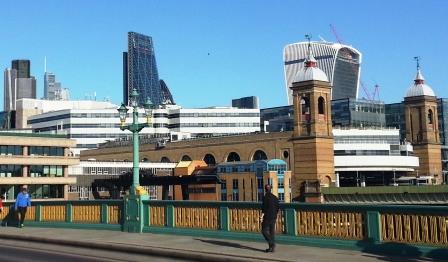
The river also seems to demarcate the cultural divide. It’s exhilarating to walk out of an office and have an immediate view of some of the most iconic buildings in the country (if not the world) — like the Shard, Gherkin, Cheesegrater, Walkie Talkie and others — but walk half a mile down Southwark Bridge Road and you’ll be in some the most deprived parts of London.
There are still plenty of semi-derilict spaces, like the poignant Cross Bones Graveyard, and the area towards Elephant and Castle, where I finally located the Ministry of Sound.
The feel of the place was summed up to me by a blackboard I saw outside a greasy caff very close to the Tate Modern, which seemed to draw most of its clientele from the builders who are busy demolishing or smashing through warehouses to create ultra-luxury penthouses or art spaces, like the Tate Modern extension.
The blackboard showed changing daily specials, usually involving chips or all-day breakfasts. I looked a bit more closely one day at this interesting menu — something which perhaps says something profound about post-industrial Britain?
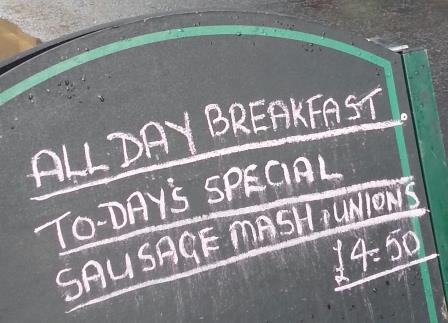
And speaking of blackboards, I was strolling along Union Street in Southwark when I came across this larger blackboard, which I discovered was part of a global network of similar blackboards all based on the simple concept of asking people to chalk up an ambition they’d like to achieve ‘before I die’.
The Before I Die concept was accidentally started in 2011 in New Orleans by artist Candy Chang who set up the first wall on a derict building while grieving over the death of a loved one. (The full story can be read on the Before I Die website.) Since then the concept has spread to many other cities across the world (at least 150 or so), including several in London.
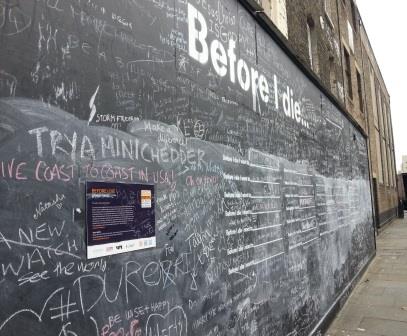
The board on Union Street (actually in a small square tucked away behind a railway viaduct called Flat Iron Square) was apparently the first of the chalkboards in London and had been up for about a year before I came across it.
I’m afraid that this board is no longer there, having presumably been removed a few weeks ago as part of the Thameslink/London Bridge viaduct works it was originally created to shield (as part of the Bankside Merge festival — see link above).
The idea behind the blackboards is brutally direct and straightforward — going to the heart of what motivates people — and reading through the anonymous, public declarations is a fascinating experience for anyone who writes fiction — or wants to understand the human condition in any other way.
As my photographs show, while there was some crass vandalism and pure obscenity chalked up on the board, this was surprisingly hugely outweighed by the clearly genuine sentiments that had stood out through the jumble of over-written messages — and perhaps they were all the more heartfelt from having been scrawled on the way back home after a well lubricated night at a pub or club.
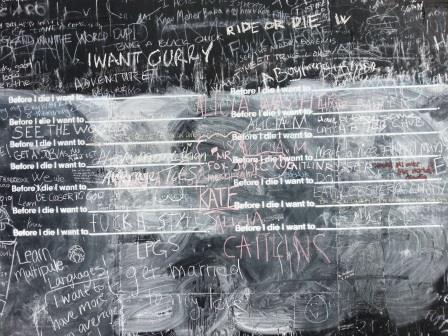
It’s a well known truism that no-one on their deathbed says they wished they had spent more time in the office, although plenty of people seem to ignore this in their own working lives. (I’m not sure whether to pity or respect people who get all the self-fulfillment they need from corporate life — on the one hand it must be gratifying to be paid to do the thing you most enjoy, but on the other you think they don’t realise the value of all the other things they haven’t experienced — a bit like blissful farm animals.)
Nevertheless, I’ve not spotted any comment on these chalkboard like ‘I want to be promoted’, ‘I want a comfortable pension’ or ‘I’d like the desk near the window’. Maybe if one of these chalkboards was put right outside a corporate HQ then it would be full of such ambitions but, even there, I doubt it.
Most of the comments seem to be on the themes of relationships (or ambitions that might help people improve their relationships) or travel — which are two of the subjects with which a large amount of fiction is concerned. (There’s also a more general theme of ambition and self-fulfillment, which tends to include both the first two categories.)
I’ll point out a few of the comments that particularly amused or intrigued me although you may be able to decipher some of the other comments in the following photos.

In addition to someone wanting to meet Ed Sheeran (pop stars recurred on the board), fear nothing and stop worrying was the more modest ambition of visiting Hull ‘City of Culture’ (interesting when the board is about quarter of a mile from where the greatest writer in world history wrote his plays).
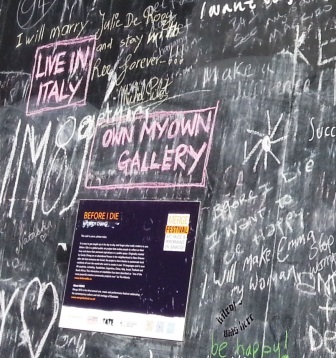
This section of the board shows the ‘official art project’ notice linking the board to the Bankside Merge festival and has a nice combination of travel, artistic ambition and romance: ‘I want to live in Italy’, ‘I want to own my own gallery’ and ‘I will make Emma my woman’.
And as well as relationship aspirations there are plenty of messages of pure desire and lust — especially about someone called H Styles.
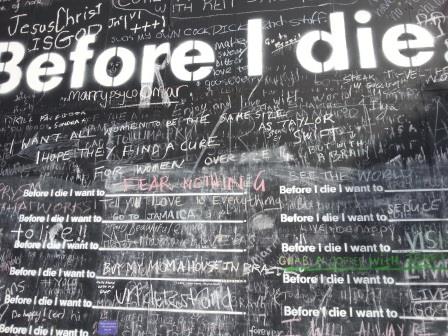
I found the message slightly buried in the centre of the photo quite intriguing: ‘I want all women to be the same size as Taylor Swift’ to which someone else has appended ‘but with a brain’.
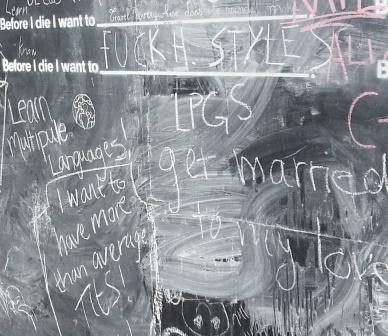
And perhaps the most honest (and it seems to have some pointed phrasing that makes it particularly heartfelt) is on the left of this photo: ‘I want to have more than average tits!’
It would be interesting for anyone writing a novel to take a few minutes and consider what their characters might write on a blackboard like this — what’s most important to them, what do they really want to achieve, whom do they lust after?
When I took my photos I couldn’t see any chalk available to add my own contribution — and I think I could think of quite a few to scrawl on there — but there’s one ambition I don’t really need to chalk. The whole of this blog is dedicated to it.
